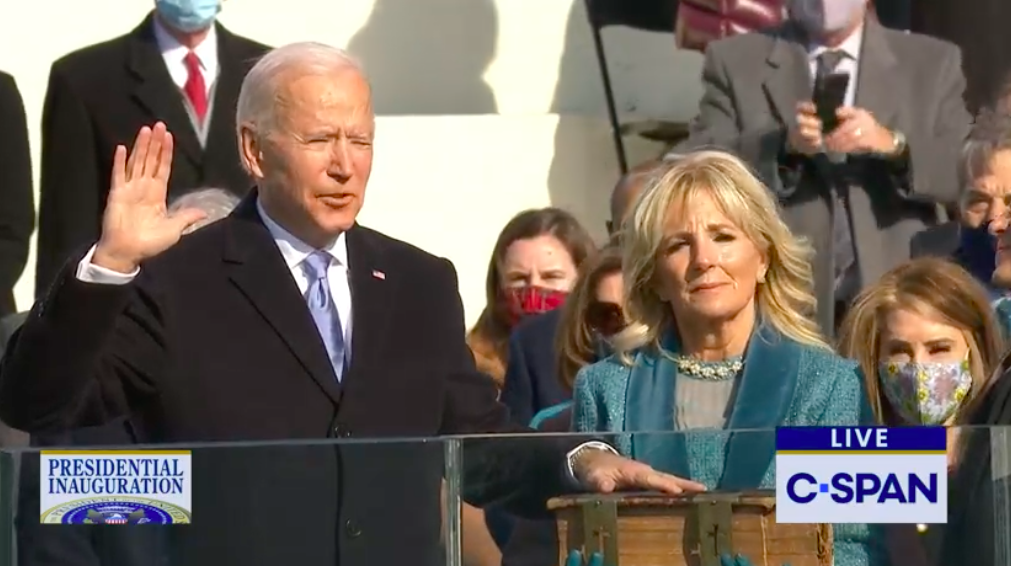
During the much-anticipated Inaugural, kicking off a hopeful new administration, it’s unfortunate that President Biden, while trumpeting a message of unity, remains tone deaf about the divisiveness of religious rhetoric.
U.S. politicians’ often gratuitous use of religion at official events makes us nonbelievers feel like outsiders and second-class citizens. While a diverse and thoughtfully-planned series of events are marking Biden’s hard-fought inauguration, there still has been a whole lot of religion going on.
The inauguration kicked off last night with a moving ceremony at the Lincoln Memorial Reflecting Pool, which was lined with 400 lights representing the more than 400,000 Americans who’ve died from Covid-19. The president-elect and his wife, with the vice president-elect and her husband stood in front of the pool. Many communities and buildings, such as the Empire State Building and the Space Needle, also lit up in solidarity and unity around the nation.
But for the nonreligious as well as non-Christian Americans, the unity of that moment was spoiled when it morphed into a religious service. After nominally religious remarks by Joe Biden and Kamala Harris, we were treated to an invocation by the archbishop of Washington, D.C., and a rendition of the Christian hymn, “Amazing Grace.” (A highlight of the inauguration today was the recitation by 22-year-old poet Amanda Gorman.)
There were many brief repeated references to religion in today’s inauguration. Although the Freedom From Religion Foundation had duly requested that Joe Biden follow constitutional dictates and take an entirely secular oath of office as written in the Constitution, as expected he placed his hand on a huge family bible and added the piety, “So help me God.” FFRF had also requested he jettison the invocation and benediction. But the invocation was led by Father Leo J. O’Donovan, a Jesuit priest, and the benediction by Rev. Silvester Beaman, pastor of Bethel AME Church in Wilmington, Del., both personal friends, and both, of course Christian.
Biden gave a powerful, gracious and conciliatory speech about being being the president of all, as a “once-in-a-century virus silently stalks the country,” as “millions of jobs have been lost . . . businesses closed” and as “a cry for racial justice, some 400 years in the making, moves us.” There was much to applaud there.
But he also referred to “one nation, under God,” said “History, faith, and reason show the way, the way of unity” and mentioned being “sustained by faith.” He quoted St. Augustine and the bible, albeit both passages secular, mentioned a prayerful verse from a song, “American Anthem,” and, no surprise, ended with the inevitable “May God bless America and may God protect our troops.”
But the bit that rankles came when Biden actually himself said and led a prayer: “In my first act as President, I would like to ask you to join me in a moment of silent prayer to remember all those we lost this past year to the pandemic. . . . Let us say a silent prayer for those who lost their lives, for those they left behind, and for our country. Amen.”
He compounded it all by the irony of making an oath “before God” to defend our Constitution — a Constitution that is godless, whose only references to religion are exclusionary, which bars a religious test for public office and which separates religion from government.
As the inauguration ended, FFRF immediately began hearing from some of our 33,000 members, who were disappointed by the religious tone deafness, who expected our 46th president to make references to believers and nonbelievers, as President Obama did in his inaugural speech.
We “Nones” have work to do, not only to untangle the union of church and state from the last administration, but to make public officials who serve our Constitution understand that they may have whatever religious beliefs they like, but should stop assuming the rest of us need to hear about those views. Pieties do not make them better leaders. And religion in government is innately divisive and exclusionary.

